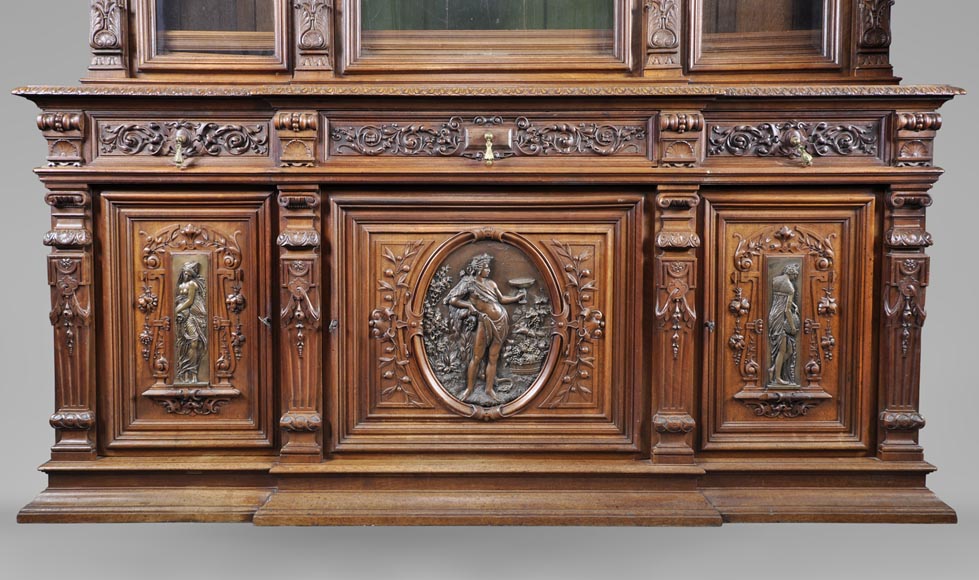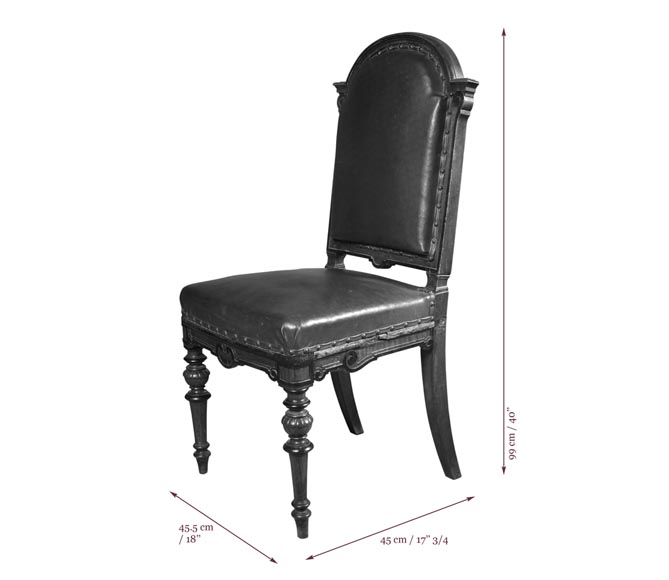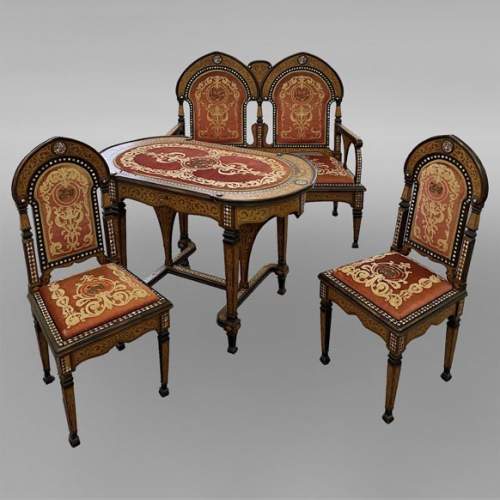Style Napoleon III / Ref.03332
Beautiful antique carved walnut wood dining room set by the french cabinetmaker Paul Mazaroz
Dimensions
Width 79'' ⅞ 203cm
Height 119'' ¼ 303cm
Depth: 23'' ¼ 59cm
Origin:
Circa 1880. Stamp on the dresser : "P. Mazaroz". Signature on the bronze : "F. Barbedienne Fondeur".
Status:
In good general condition. Some missing part on the dresser and on the table (restoration possible).
This Neo-Renaissance style dining room set, stamped by Paul Mazaroz, is made up of fifteen pieces including:
- A large dresser with beveled glass doors and putti decoration. H. 303 cm; W. 201 cm; D. 60 cm (119 x 79 x 23.5 in).
- An oval-shaped table with putti riding dolphins. L. 145 cm; W. 123 cm; H. 73 cm (57 x 48.4 x 28.7 in) and five 50 cm-large extensions. The initials “EF” at the center of the table are made of Thin dark Belgium black marble marquetry, malachite, lapis lazuli, red antic marble, and Sienna yellow marble.
- A serving table. H. 95 cm; W. 97 cm; D. 50 cm (37.4 x 38.2 x 19.7 in).
- Twelve chairs without padding.
The furniture is made of walnut with bronze ornaments. The Bacchus medallion on the dresser is gold-plated. Signature of Ferdinand Barbedienne on the bronzes.
Paul Mazaroz was a sculptor who began his career working for Ribailler in the 1850's. At the World's Fair of 1855, Mazaroz exhibited several pieces of furniture himself. At this point, his success and popularity started to grow, particularly at the World Fairs of 1867 and 1878 where he won silver medals. The Mazaroz firm disappeared in 1890.
This dining room is inspired by neo-Renaissance trends. The 19th century is known as the century of “eclecticism” in decorative arts, during which artistic styles from past centuries were rediscovered and mixed together to create original objects, furnishings, and monuments. Certain styles are particularly historicist, like the “neo-Gothic” style, the “neoclassical” style, and the “neo-Renaissance” style. The Paris Hôtel de Ville (town hall) is a prime example of French neo-Renaissance architecture.
Paul Mazaroz mainly produced furnishings inspired by the Renaissance, like for this dining room.
The angular shape of the dresser and its mannerist low-relief figures, the leafy motifs and putti are all Renaissance-inspired.
Informations
Price: on request
Recommended for you :
Dimensions:
Width: 230
Height: 274
Depth: 69
Dimensions:
Width: 85
Height: 82
Depth: 57
Dimensions:
Width: 191
Height: 293
Depth: 56
Dimensions:
Width: 172
Height: 79
Depth: 106
Dimensions:
Width: 230
Height: 262
Depth: 66
Dimensions:
Width: 303
Height: 76
Depth: 115
Dimensions:
Width: 163
Height: 182
Depth: 66
Dimensions:
Width: 126
Height: 74
Depth: 36
Dimensions:
Width: 159
Height: 80
Depth: 98
Dimensions:
Width: 138
Height: 77
Depth: 85





































